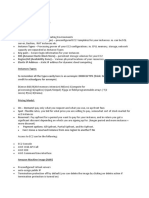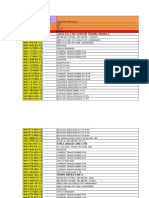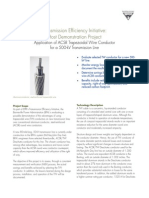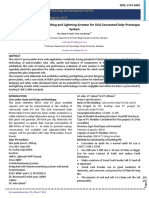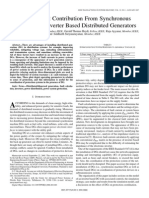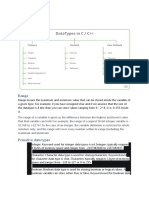Power System Analysis
Power System Analysis
Uploaded by
chanakya_7h5295Copyright:
Available Formats
Power System Analysis
Power System Analysis
Uploaded by
chanakya_7h5295Original Title
Copyright
Available Formats
Share this document
Did you find this document useful?
Is this content inappropriate?
Copyright:
Available Formats
Power System Analysis
Power System Analysis
Uploaded by
chanakya_7h5295Copyright:
Available Formats
Intelligent Self-Describing Controllable Electric Power Grid
Anurag Srivastava, Noel N. Schulz, Nicolas Younan, Roger King, Srinath Kamireddy,
and Bharath Ravulapati, Department of Electrical and Computer Engineering
Kari Babski-Reeves and David Close, Department of Industrial and Systems Engineering
Surya Durbha, GeoResources Institute
Mississippi State University
Abstract
Electric power grids are a key network in both day-to-day activities and in recovery efforts following natural disasters. This complex system may also be subject to blackouts caused by system instabilities or external threats. A key infrastructure issue relates to
the models, studies and simulations of this complex network system, especially in the Gulf Coast region, which is vulnerable to hurricanes. It is necessary for electric utilities to handle these extreme conditions and recover as quickly as possible. Researchers at
Mississippi State University with the help of regional utilities are working to develop a tool based on detailed power system analysis and a semantic-based ontology to provide web-based information and decision support. During a recent hurricane, one utility in
Mississippi was able to restore power to customers in an efficient way using intentional islanding. System separation or intentional islanding of the electric grid should be done in an effective way to help restoration and not create system instabilities.
Electric network state data and up-to-date measurements will be published on the web and feature extraction will be done using ontology web language (OWL). Comprehensive power system analysis is progressing to develop a rule based-system to highlight
methods for system separation and other restoration techniques. A visualization tool that incorporates operators in the decision loop can provide demand based situational awareness and decision support to provide assistance to utilities in extreme conditions.
Project Overview and Description
MSU Project Team Industrial Partners Objectives
• To develop semantic driven ontology based information services for wide area monitoring
Dr. Nick Younan Tennessee Valley Authority (TVA) of the electric power grid.
Principal Investigator • Specifically, the project is focused on response-based remedial action schemes (RAS) and
South Mississippi Electric Power Association (SMEPA)
restoration techniques that can be used to mitigate cascading blackouts and severe
Southern Company (SoCo)
contingencies via system separations (islanding), distributed generation and conventional
Drs. Roger King/ Dr. Noel Schulz Dr. Kari Babski-Reeves Alabama Power Company (APC) techniques.
Nick Younan Power System Lead Human Factor Lead Mississippi Power Company (MPC) • The semantics driven information services will provide critical information and a course
Ontology Development Lead of action in a timely fashion to system operators.
Dr. Anurag Srivastava • This will be enhanced with new visualization schemes that are based on operator cognitive
Dr. Surya Durbha David Close task analysis (CTA).
2 Graduate Students
Srinath Kamireddy
Bharath Ravulapati
Electric Power Grid Control
Post-contingencies studies show that based on system states, and with proper
Power System Research Activities
decision support system, decisions can be taken in advance as well as in real time
Grid Complexity and Problems to avoid the blackouts and to restore the power more efficiently. Researchers are working on developing or modifying CIM for sensor data and developing rule bases for
remedial action schemes and restoration during extreme contingencies by doing detailed power system
Steady State analysis on 38-bus power system in PowerWorld 12.0. Work related to the investigation of state
Control
• Highly nonlinear system, aging infrastructure, power market, transmission expansion to estimation algorithms in the case of lost state data is also in progress.
meet growing demands, congestion management, handling distributed resources, dynamic State Data SCADA/EMS Feedback
Based Control
reactive compensation, reliability coordination, need for oversight or regulatory audits, Simulate N-1,
System separations
N-2, ….N-n
balancing between resource adequacy, reliability, economics, environmental constraints, State Data Operating Simulations
contingencies
and using DG
Contingencies Grid
and other public purpose objectives to optimize transmission and distribution resources to Contingencies Conventional techniques Fix violations
meet the needs of the end users. Actual (capacitor switching, and find optimized
Contingency load shedding, physical location of
• Approximately 24 outages per year in the United States advanced reactive
Decision controlled separation
with curtailments in 100 to 1,000 MW range Automatic Emergency support etc
Support Operator Controls Control
• About 5 outages in 1000 to 10,000 MW range Intervention Create islands RAS and restoration
• One outage every 4 years at 10,000+ MW. Pre-Programmed Actions technique
• This is a global issue RULE
No Operator Involvement
• Days needed to restore power after Hurricane Katrina Human in the Loop
BASE
Human Factor Research Work
Research Activities Related to Semantic Web For ontology development
To do knowledge extraction and to
Application Actionable
Summary
provide decision support to operators Substation Data
Data Domain Information
Flow
Intelligence Researchers are
Flow
a software tool based on ontology working on developing • The electric power grid is part of this country's critical infrastructure.
will be developed using web sensors, Load Center
Data
Application
Information
Flow an improved • Grid needs to be enhanced to incorporate the latest advances in sensing,
Data Domain
OWL, and sensorML. Sensor web visualization strategy communication, services, and visualization technologies.
Middleware
Flow
Middleware
Knowledge
enablement provides an extensive Flow to assist with • To protect this asset, we need to develop ontology based information services for
Generator Information
Application
monitoring and sensing system that Status
Data Domain
Flow
situational awareness
Contingency
Contingency
1
2
Data
Data
Data
Data
Data
Data
power system monitoring and control. An architecture for using the semantic web
Flow
contributes timely, comprehensive,
Contingency 3 Data Data Data
and a sensor web enablement has been proposed here for wide area monitoring and
SCADA Resource discovery, Distributed Data
Resolve information Domain Specific knowledge
building and decision support Contingency 4 Data Data Data
metadata access, Analysis Centers
heterogeneity
(semantic,syntactic, through ontological
Contingency
Contingency
5
6
Data
Data
Data
Data
Data
Data power system monitoring, operation and control in general.
continuous, and multi-mode browse data pool (Control areas,
Research labs,
format,etc) Modeling
(OWL,DAML+OIL,etc)
for reliability and … Data Data Data
Structure Universities, etc)
observations for the power systems. Retrieval generation desks based
Reasoning
A rule base developed by detailed Action on CTA and current Acknowledgements:
power system analysis will be Data Information Knowledge Meaning visualization.
This research work is sponsored
included in the ontology to provide Reliability Desk
Generation Desk by DoHS/ORNL Funds: 63886
decision support. World Wide Web Semantic Web
You might also like
- PowerWorld Transmission Line Parameter Calculator - TransLineCalcHelp1No ratings yetPowerWorld Transmission Line Parameter Calculator - TransLineCalcHelp117 pages
- According To The IEC 60909: From Open Electrical100% (1)According To The IEC 60909: From Open Electrical15 pages
- Lightning Performance of Cmpact Lines PDFNo ratings yetLightning Performance of Cmpact Lines PDF20 pages
- Switch Yard Equipment Upload Template 30-06-2013 - Ver - 0No ratings yetSwitch Yard Equipment Upload Template 30-06-2013 - Ver - 085 pages
- Lightning Over Voltage Performance of 132kV GIS Substation in MalaysiaNo ratings yetLightning Over Voltage Performance of 132kV GIS Substation in Malaysia7 pages
- Current Limiting Reactors & Short Circuit Currents - Electrical EngineeringNo ratings yetCurrent Limiting Reactors & Short Circuit Currents - Electrical Engineering12 pages
- ECO Conductors Low Loss Conductor SolutionNo ratings yetECO Conductors Low Loss Conductor Solution2 pages
- Practical Example of Arrester and TransformerNo ratings yetPractical Example of Arrester and Transformer6 pages
- Medium-Voltage Surge Arresters US - Catalog HP-AR 25 PDFNo ratings yetMedium-Voltage Surge Arresters US - Catalog HP-AR 25 PDF47 pages
- 10 Application of ACSR Trapezoidal Wire Conductor For A 500-KV Transmission Line100% (1)10 Application of ACSR Trapezoidal Wire Conductor For A 500-KV Transmission Line2 pages
- Equivalencing The Collector System of A Large Wind Power PlantNo ratings yetEquivalencing The Collector System of A Large Wind Power Plant16 pages
- Lightning Performance of EHV and UHV OverheadNo ratings yetLightning Performance of EHV and UHV Overhead6 pages
- Aluminum Conductor Steel Reinforced (ACSR) SPLN 41-7:1981: Dimensional & Mechanical Data Electrical DataNo ratings yetAluminum Conductor Steel Reinforced (ACSR) SPLN 41-7:1981: Dimensional & Mechanical Data Electrical Data1 page
- Design and Evaluation of Earthing and Lightning Arrester For Grid Connected Solar Prototype SystemNo ratings yetDesign and Evaluation of Earthing and Lightning Arrester For Grid Connected Solar Prototype System5 pages
- Advancements in Transmission Line Fault LocationNo ratings yetAdvancements in Transmission Line Fault Location143 pages
- 113 - 02 - Bare Conductor Heating & CoronaNo ratings yet113 - 02 - Bare Conductor Heating & Corona50 pages
- Design of 220 KV Substation Grounding GridNo ratings yetDesign of 220 KV Substation Grounding Grid7 pages
- DCR - LGE001-CSA-CAL-103 150 KV Switchyard Structure Calculation - Lightning Arrester (LA) Rev 1No ratings yetDCR - LGE001-CSA-CAL-103 150 KV Switchyard Structure Calculation - Lightning Arrester (LA) Rev 17 pages
- Short Circuit in Power System: Technical Colloquium Indonesia PLN - ABBNo ratings yetShort Circuit in Power System: Technical Colloquium Indonesia PLN - ABB43 pages
- IEEE 2012 Matlab Simulink Power Electronics Projects (Hosur, BanGalore, Mysore, ManGalore, Karnataka)No ratings yetIEEE 2012 Matlab Simulink Power Electronics Projects (Hosur, BanGalore, Mysore, ManGalore, Karnataka)16 pages
- Fault Current Contribution From Synchronous Machine and Inverter Based DGNo ratings yetFault Current Contribution From Synchronous Machine and Inverter Based DG8 pages
- Modeling of Photovoltaic Systems Using MATLAB: Simplified Green CodesFrom EverandModeling of Photovoltaic Systems Using MATLAB: Simplified Green CodesNo ratings yet
- Grid-Integrated and Standalone Photovoltaic Distributed Generation Systems: Analysis, Design, and ControlFrom EverandGrid-Integrated and Standalone Photovoltaic Distributed Generation Systems: Analysis, Design, and ControlNo ratings yet
- Neuro-Fuzzy Approach For Fault Location and Diagnosis Using Online Learning SystemNo ratings yetNeuro-Fuzzy Approach For Fault Location and Diagnosis Using Online Learning System8 pages
- Short-Term Photovoltaic Power ForecastingNo ratings yetShort-Term Photovoltaic Power Forecasting12 pages
- Comparison of Fuzzy Time Series, ANN and Wavelet Techniques For Short Term Load ForecastingNo ratings yetComparison of Fuzzy Time Series, ANN and Wavelet Techniques For Short Term Load Forecasting10 pages
- A Review on the Applications of Reinforcement Learning Control for Power Electronic ConvertersNo ratings yetA Review on the Applications of Reinforcement Learning Control for Power Electronic Converters6 pages
- Dynamic Behavior of Combined 100 IBR Transmission and Distribution Networks With Grid-Forming and Grid-Following InvertersNo ratings yetDynamic Behavior of Combined 100 IBR Transmission and Distribution Networks With Grid-Forming and Grid-Following Inverters5 pages
- Material Flow Systems in Manufacturing - J.TanchocoNo ratings yetMaterial Flow Systems in Manufacturing - J.Tanchoco404 pages
- Quantitative Analytical Methods: Dr. Alistair BensonNo ratings yetQuantitative Analytical Methods: Dr. Alistair Benson77 pages
- Oracle Questions & Answers: Exam InformationNo ratings yetOracle Questions & Answers: Exam Information26 pages
- Sistem Informasi Geografis Pemetaan Lahan PertaniaNo ratings yetSistem Informasi Geografis Pemetaan Lahan Pertania12 pages
- A Project Report On Consumer Awareness About NANDINI Milk and Milk Products, and Impact of Promotional Activities On Creating AwarenessNo ratings yetA Project Report On Consumer Awareness About NANDINI Milk and Milk Products, and Impact of Promotional Activities On Creating Awareness47 pages
- Write A Servlet Program To Select The Record From The DatabaseNo ratings yetWrite A Servlet Program To Select The Record From The Database6 pages
- Studi Kasus SQL Injection Vulnerabilities AssessmentNo ratings yetStudi Kasus SQL Injection Vulnerabilities Assessment1 page
- Validity in Research 1: KM-Daytner@wiu - EduNo ratings yetValidity in Research 1: KM-Daytner@wiu - Edu16 pages
- Working With Database Tables Student VersionNo ratings yetWorking With Database Tables Student Version12 pages
- First Normal Form: Patient Name Drug Trade Name Formulatio N Size Dose Frequency Side EffectNo ratings yetFirst Normal Form: Patient Name Drug Trade Name Formulatio N Size Dose Frequency Side Effect4 pages
- Assignment On Paper 6 Topic: Graphical Presentation - HistogramNo ratings yetAssignment On Paper 6 Topic: Graphical Presentation - Histogram7 pages
- Functions and Types of Marketing ResearchNo ratings yetFunctions and Types of Marketing Research34 pages
- 4. ព្រឹត្តបត្រស្រាវជ្រាវអប់រំ - ភាគ៤ (ENG - KH)No ratings yet4. ព្រឹត្តបត្រស្រាវជ្រាវអប់រំ - ភាគ៤ (ENG - KH)184 pages
- Complete Download Web Semantics: Cutting Edge and Future Directions in Healthcare 1st Edition Sarika Jain PDF All Chapters100% (1)Complete Download Web Semantics: Cutting Edge and Future Directions in Healthcare 1st Edition Sarika Jain PDF All Chapters55 pages
- Case Study On Processing Data Driven For HealthNo ratings yetCase Study On Processing Data Driven For Health9 pages

